Our privacy-friendly analytics solution, Koko Analytics, is able to pick up referrer data for certain visitors (meaning where the visitors come from). Thanks to these statistics, I occasionally see interesting or unusual search engines in our logs. I have turned many of those posts into Leaflets, one of which was our most-read article in July. On October 15, 2022, Norton Safe Search appeared for the first time in my Koko Analytics referrer logs. Something about its URL, which included ask.com, piqued my interest. As a result, I present to you an unexpectedly long and detailed look into what Norton Safe Search is, how it works, and why it ultimately fails to fulfill its stated mission.
Note: I wrote a companion post on how to create a custom search engine shortcut for Norton Safe Web, an idea which followed from my excessively in-depth examination of Norton Safe Search. With that being said, note that I undertook this project out of curiosity and am not using either service.
Note on Style of Review
I decided to write this review while I was in the process of testing Norton Safe Search. That is, you will learn about Norton Safe Search as I learned about Norton Safe Search, through actually using it. Only toward the end of the article do I study the About Page and the Privacy Policy for the tool, both of which confirmed the hunches and suspicions that I had during testing (I suppose Norton deserves a hat tip for being generally intelligible). The format of this review is the result of the fact that (A) the homepage for Norton Safe Search does not link to its about page or privacy policies, and (B) all of my initial impressions were correct, so I saw no need to re-do the piece beginning with the Privacy and About pages. (I added this section after the fact to explain my process in composing the piece.)
Discovering Norton Safe Search
Someone used Norton Safe Search to reach The New Leaf Journal on October 16, 2022. I discovered this when I saw the following URL in my referrals:
nortonsafe.search.ask.com/search
I could immediately see that Norton, the commercial antivirus company which recently made waves by turning some of its customers into lite cryptominers (that brilliant program was recently terminated), offers a search product. Now in light of the fact that I have bemoaned occasional appearance of internet service provider search front-ends appearing in the logs, one would likely (and correctly) suspect that I would have similar views about Norton. What is it about Norton Safe Search that inspired me to do a regular article write-up instead of a Leaflet, an honor previously only given to the novel (and privacy-friendly) Peekier Search Engine?
Even without seeing the full URL, I would have ventured with high confidence that Norton was licensing and piggybacking off someone else’s – most likely Bing’s – search index. This has been the case for nearly every alternative (meaning not Google or Bing) search engine that I have looked at. However, in this case, the referrer URL expressly referenced the source of Norton’s search: Ask.com. Now I know of Ask, but I know little about it. I have never used it, and despite the fact that I have written a bit about online search, Ask had never before crossed my radar in a direct way. In discussing Norton Safe Search, we might examine the source of Norton Safe Search’s results. This could lead us down a rabbit hole, for we might need to ascertain the source of Ask’s search results.
Opening Norton Safe Search
My quest to test Norton Safe Search had a rocky start when Norton failed to open in my browser. This is not technically Norton’s fault. I run uBlock Origin in my primary browser with aggressive script and resource blocking enabled. That Norton does not cooperate with strict script blocking is not unique to Norton. Certain generalist alternative search tools, such as DuckDuckGo, Qwant, Brave Search, and Mojeek, cooperate to varying degrees with strict script blocking. Others, like Startpage, Swisscows, and Peekier do not. In Norton’s case, opening it requires the azure.com and static.nortoncdn.com domains to run, as well as an akamaiedge.net which only appears after allowing the azure.com domain in the screenshot. The Google Analytics domain can remain blocked.
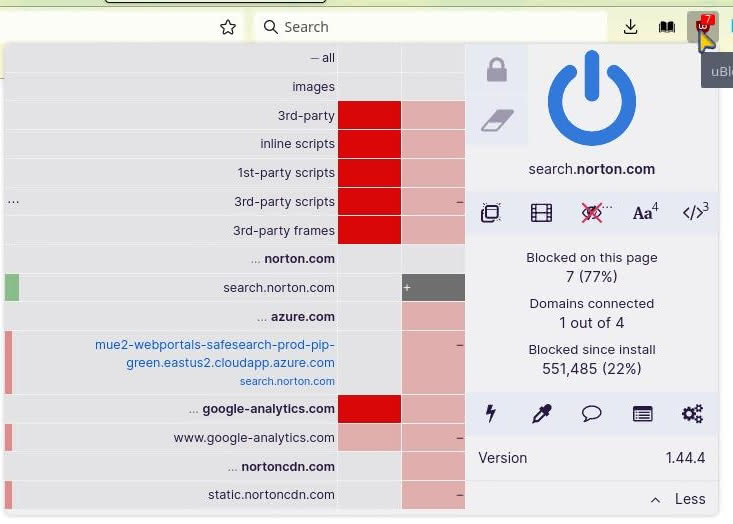
Norton Safe Search’s inclusion of Google Analytics on its homepage provides an idea of its focus. Most of the alternative search tools that I have looked at have, to some extent or another, an avowed privacy emphasis. In having this emphasis, the tools are generally presented as alternatives to Google (Bing is often a more complicated issue since most, but not all, of the tools that I have looked at, license Bing’s search index). For this reason, most of the tools do not incorporate Google Analytics or cookies, although I did note one amusing counter-example.
Norton, however, is a security company – not a privacy company. From what I know about Norton, in conjunction with it use of Google Analytics on the home page, this tipped me off that the mission of Norton Safe Search is not to emphasize privacy, but rather to emphasize safe browsing. (Note that this assessment comes to you separate and apart from whether such a solution is in any way needed.)
The Norton Safe Search Homepage
I decided to test Norton Safe Search in Badwolf, a simple Linux web-browser based on WebKit that I often turn to for screenshots. Norton Safe Search’s homepage is more than a bit busy.
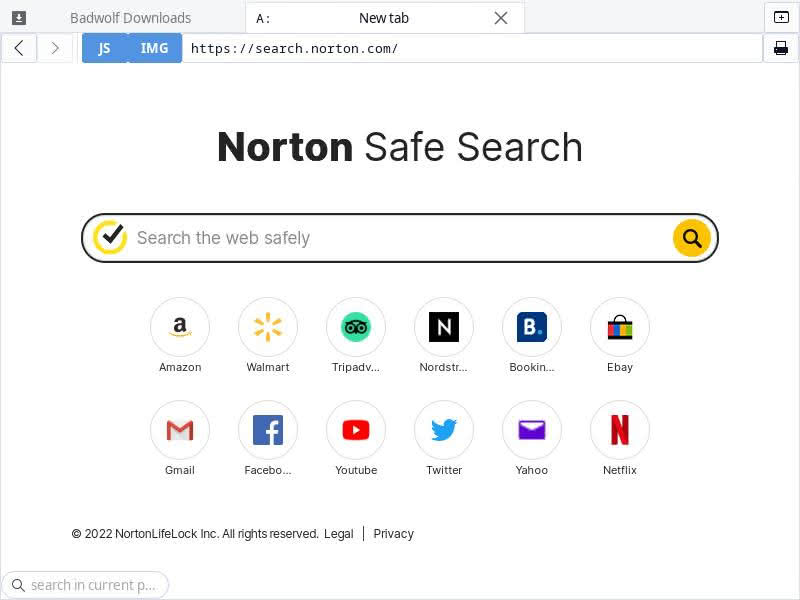
I assume, but am not certain, that the links below the Norton Search Bar are mostly sponsored links. I recall seeing some of these companies as default shortcuts on my most recent install of the Vivaldi web browser a couple of years ago. It is possible that some of the links were chosen by Norton as being potentially useful to users. There does not appear to be any way to change or configure the links. For whatever it is worth, I prefer my search engines to not come with links to external sites on the homepage.
I checked the “Privacy” link (see bottom-left of the screenshot). I was disappointed to see that the link did not take me to a page with information about Norton Safe Search, but instead to a general privacy page with many links about Norton’s suite of services. I discovered (and will discuss below) that Norton does actually provide information about Norton Safe Search specifically from search results page. I hope that Norton makes this information available on the search homepage as well.
Now let us try a search…
Testing Norton Safe Search
Before I get into the details, searching from Norton Safe Search’s homepage revealed an unusual behavior. I expected my search results to replace the homepage in the same tab in which I had the homepage open. However, my search results opened in a new tab. I am not sure why this is the case, although it is worth noting the different URLs. The homepage is available at search.norton.com, but the results are found at nortonsafe.search.ask.com. It seems that Norton Safe Search’s results are a subdomain of ask.com whereas the homepage is a subdomain of Norton (note: this would prove to be correct).
I initially tried running a Norton search in my primary browser. However, the page initially did not display correctly because the scripts that I enabled on the Norton Safe Search homepage were not relevant to the search results page. Very interesting. See the below screenshot for what I needed to enable in order for the results page to display properly:
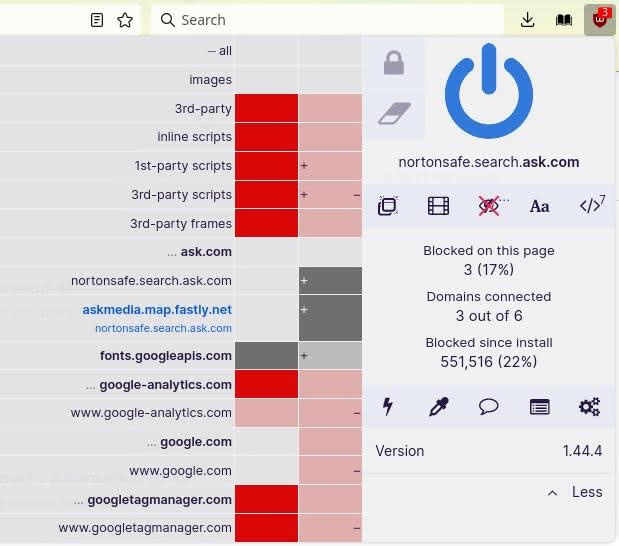
Here, we have the first appearance of the ask.com domain, which I noted in the referrer URL I saw. We again have Google trackers (Analytics and Tag Manager), but neither need to be enabled for the page to function properly. Now let us see the results:

I will give credit where it is due, the Norton Safe Search results page is very clean for my very non-biased query. The user interface is pleasant, albeit ordinary, enough. I was curious whether there would be ads for different searches. Let us try a search that is just begging for spam results: “best blogs 2022”:
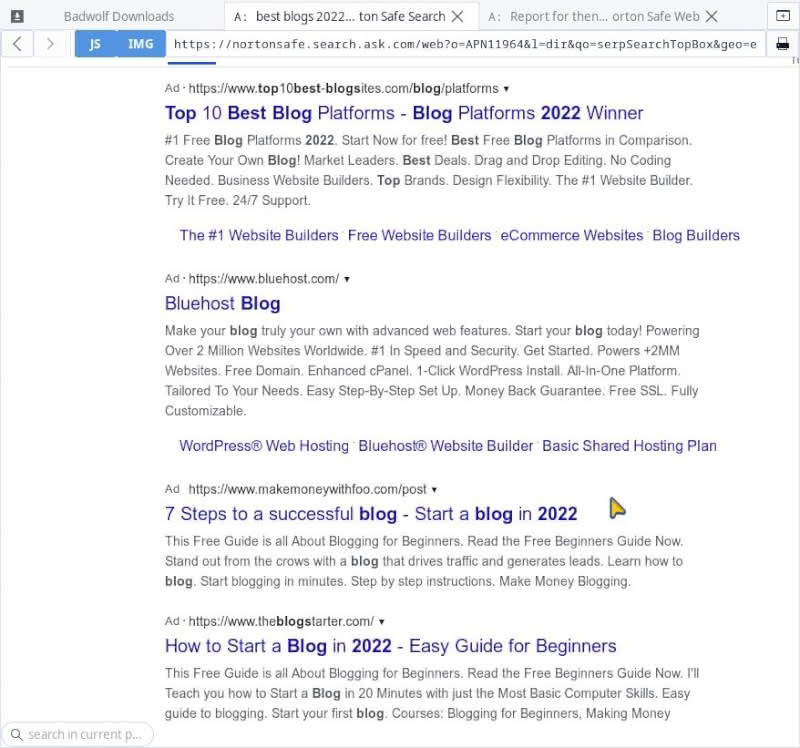
Norton does have ads, like most search engines and tools. The ads are clearly marked well enough, although there is one significant issue with their presentation – which I will get to shortly – which undermines the ostensible mission of Norton Safe Search. The ads also come with images in some cases:

Hovering over the ads for the URLs reveals that they are served by Google, which is unsurprising having already noted the presence of Google Analytics and Google Tag Manager. I will note as an interesting point that in Firefox, where I have uBlock Origin installed, there are no ad results for any Norton searches. With uBlock Origin or a different respectable ad blocker with proper filters, it appears that Norton can be nudged to deliver an ad-free search experience.
Now let us look at organic search results, that is – results responding to our actual query instead of ads.
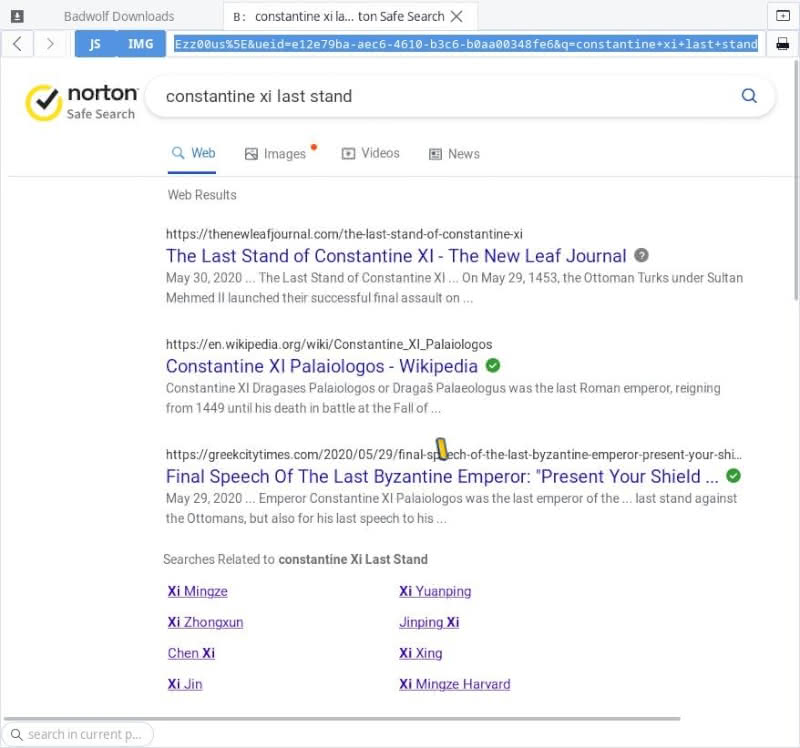
Note that there are green dots next to the second a third results, but not next to my article at the top. These dots represent Norton’s site safety ratings. These come from Norton Safe Web, which is a free online reputation service. Thus, if Norton has checked a site and deemed it to be free of certain malicious threats, the site receives a green check. In my case, The New Leaf Journal has never been checked by Norton as of this writing, so we have a gray question mark circle. I was curious what a suspect site would look like in Norton search.
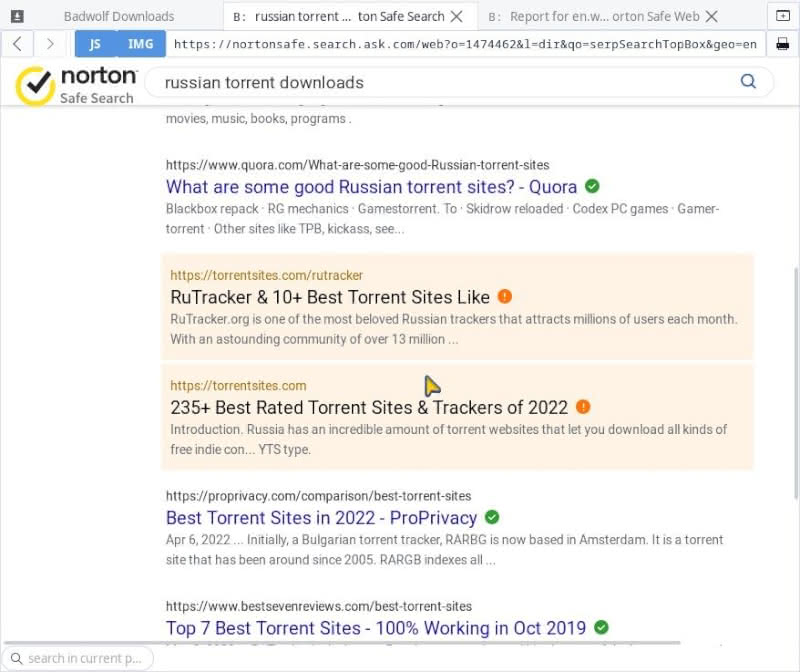
I tried a few queries before finding a few sites which Norton has adjudicated to be suspect in a search for “Russian torrent downloads.” Here, you can see that Norton marks these two sites as orange with an exclamation point. (There is probably a red “do not go warning,” but I am only going to work so hard to try to make questionable websites appear.)
Note that I am not going to review Norton’s image, video, and news search specifically, other than to note that the video search results come exclusively from YouTube and that news results occasionally appear on the main results page.
The Fatal Flaw of Norton Safe Search
The unique feature of Norton Safe Search is its integration with Norton’s Safe Web ratings. Absent that, this search tool is one in a sea of search tools, and many, if not most of offer more bells and whistles than Norton Safe Search. Recall that I observed that Norton’s handling of ads betrayed a fatal issue with its search product. In saying that, I was not referring to privacy or commercialism, but instead to the fact that the ads do not come with Norton Safe Web Ratings. The entire point of this search tool is that you have the Norton Safe Wen integration. In some cases, ads represent the first five results (and more when the ads show up in a slider). Thus, depending on screen size (and especially on mobile), a query may fill one’s page with ad results that do not have Norton Safety ratings on them. Norton cannot fall back on the fact that the ads are served by Google and that Google (I hope) would not serve ads from malicious domains. One might ask why, if that is the reasoning, he or she should not just use Google Search.
The lack of Norton’s ratings does not only appear with ads, but also for its image, video, and news searches. This can be excused with respect to the video search because the video search appears to only search YouTube, and Norton grades YouTube as safe, but it is a major oversight on image and news searches, both of which search the web.
Do note that I am not making the cause that Norton Safe Search’s Safe Web integration is useful per se. It is not something that I personally have a use-case for. The problem is that despite the fact that the purpose of this search tool is to display Norton Safe Web scores for search results, it fails to display the scores for many of the links that it returns in response to queries. While granting that Norton Safe Search does mark ads, I suspect that a non-insignificant number of its users may not always note which results are ads or fully consider the distinction between Google Ads results and organic results.
Learning More About Norton Safe Search
While the Norton Safe Search homepage provides little-to-know information about what the tool is for, there are links to About and Privacy pages for the tool at the bottom of its results pages.
Let us examine both pages.
Privacy Policy
The Privacy Policy makes makes clear what I suspected from the domain for Norton search results:
Norton has teamed up with Ask.com to provide you with Norton Safe Search. The Norton Safe Search results page is hosted by Ask.com.
In addition to confirming that Norton Safe Search is essentially an overlay for Ask.com, the placement of this statement from Norton subtly distinguishes the tool’s homepage for the tool from the results page and disguises the import. As I noted, the Norton Safe Search homepage is a subdomain of norton.com. But the results page is a subdomain of ask.com. Norton should make this clear both in the instant privacy policy and on its search homepage.
Because Norton Safe Search results are not only served by Ask.com, but served on Ask’s domain, searches are subject to Ask.com’s privacy policy (see archived version). Ask.com’s privacy policy, which allows for IP collection, extensive browser information capture, sharing information with third parties, and behavioral advertising (it also does not respect do not track headers) is not great, not the best – but to be fair, Ask.com does not tout itself as a privacy-friendly search engine.
About Page
The About page reveals the ostensible purpose of Norton Safe Search. It is what we suspected:
Norton Safe Search is a search engine focused on online security that helps protect users from visiting phishing and other risky sites that may appear in search results. It uses Norton Safe Web technology to rate websites according to their safety. Norton Safe Search is included in Norton protection plans offered online or in retail. Norton Safe Search is not exclusively available in Norton protection plans; it is also available online for free. You can also install it by visiting the Norton Safe Search install page.
The purpose of the tool is, by Norton’s account, to integrate Norton Safe Web into search. Norton emphasizes this integration in the next point of its FAQ by citing to it as the reason why the tool is distinguishable from Bing, Yahoo, and Google. I again note that this makes the fact that Norton failed to integrate Safe Web with ad results a very glaring omission.
(I will address the “installation” in the penultimate section of this review.)
The About Page, to its credit, provides a clear statement on how Norton Safe Search works and its implications for user-privacy for those who only read the FAQ and not the Privacy Policy:
When you submit a search query through Norton Safe Search, it will be directed to Ask.com where your query is processed, and the search results are provided. Norton Safe Search does not provide any information about you to our Search Partners. As part of your use of Norton Safe Search, Search Partners may collect and/or ask you to provide certain information. Please see the Search Partner’s Privacy Policy…
While I am not a fan of Norton Safe Search’s set up or its absolute deference to Ask.com, this is a very clear and concise explanation of how it works and a good example for other services to follow in their FAQs.
Norton’s Reliance On Ask.com
Norton Safe Search is an alternative user interface for Ask.com’s search functionality. It is only distinguishable in that it has Norton branding and the Safe Web integration. Thus, in understanding where its results come from, the situation is different than for most alternative search engines that do not have their own indexes. DuckDuckGo, Qwant, Oscobo, Lilo, Swisscows, and Peekier, for example, rely on Bing’s search index for most of their results. To say that Norton relies on Ask.com for results would be an understatement. Norton Safe Search is Ask.com with a coat of paint.
Thus, in order to understand where Norton’s results come from, we must ask about Ask.
As an initial matter, I ventured that Ask itself draws its results from an existing index instead of crawling the web itself. From studying Norton, I suspected that Ask’s results came not from Bing like most alternative search tools, but instead from Google. While asking Ask about the source of its results was not particularly helpful, it was clear after testing a number of queries that Ask’s results distinct from Bing’s but identical to Google’s, differing only in their presentation, and. (Note: I only ran a small number of test searches to determine whether Ask’s results came from Google or Bing, this is not the result of a comprehensive study or survey, something I will not undertake because I have no interest in using Ask in my own search flow.)
Thus, it appears that all of “Norton’s” results ultimately rely upon Google’s index, through Ask as an intermediary.
My Assessment of Norton Safe Search
Figuring out what the deal was with Norton Safe Search was interesting. However, I struggle to see what recommends it for real-life use. It offers no privacy benefit, which is often what alternative search tools use to distinguish themselves from Google and Bing. Nothing about Norton Search provides an improved search experience – it is lacking in features compared to other more robust search engine portals but is much heavier than genuinely light tools. Its only unique feature is its integration with Norton’s domain trust service, and to the extent that one may find that service useful, it is available for free without using Norton Safe Search.
While reaching my conclusions, I also considered how Norton could improve its search tool. Although Norton is not something that I would ever use, it could, in theory, provide a better service to Norton customers than the current product. I submit the following suggestions:
- In light of the fact that Norton Safe Search’s single distinguishing feature is its integration of Norton’s website ratings, the tool needs to include the website ratings on every result – including ads, images, and news. Including the ratings on some links but not others undercuts the purpose of the tool and may confuse Norton’s customers. While the failure to apply Norton Safe Web integration to ads is ameliorated by the use of an adblocker, I will venture that many Norton users do not use ad-blockers, and an ad-blocker should not be required to fix a design flaw in the search tool. (I exempt videos from this suggestion only so long as all of the video results are from YouTube, but were Norton to offer broader video search functionality, it would need to include safety ratings for video search results as well.)
- It is my impression that Norton Safe Search is severely limited by the fact that it is, at the moment, nothing more than an alternative user-interface for Ask.com. Ask’s results are clearly derivative of Google’s (only distinguished by having a worse presentation). Norton could make a far more useful tool if it hosted its own search provider while licensing Google’s search index. The privacy-focused Startpage search engine already does this (I personally use Startpage whenever I want to run a query against Google’s index).
- While Norton’s focus is not user-privacy, it would be able to set its own terms of service and ads policy if it ran Norton Safe Search instead of outsourcing that responsibility to Ask.com.
- Ultimately, although I am not a paying Norton customer (and I have no plans to change that), Norton should offer an ad-free search experience to its paying customers. That would make it a more attractive service to people who are already using Norton products. However, this is likely only possible if Nortion takes more initiative in its own offering.
Following these suggestions would not prompt me to use Norton Safe Search, but I do think that doing so would make it a better and potentially more useful product for people who find value (or comfort) in seeing trust ratings next to websites in search results.
Using Norton Safe Search
I find it unlikely that many people will read this article and come away from the experience determined to make Norton Safe Search their primary search tool. However, for those of you who may be interested in trying it, I offer a better suggestion for how non-Norton customers can use it without installing an extension. In prior articles on domain-specific searches with DuckDuckGo, search timers for Brave and DuckDuckGo, search timers for Google, and custom shortcuts for Wallabag and other bookmarking services, I described the process for adding custom search engines to browsers based on Chromium (e.g., Google Chrome, Microsoft Edge, Brave, Vivaldi, and Opera) and Firefox. You can add Norton Private Search, or almost any search engine or search box, to most modern browsers without needing to install an extension.
In order to add Norton to your modern browser manually, you will need its GET URL. Its GET URL is as follows:
https://nortonsafe.search.ask.com/web?q=%s
You can consult my articles on custom search engine shortcuts for guidance on how to add that URL to your list of search engines (if you are so inclined). Because adding custom search engines is a simple process (albeit aided greatly by a different extension on Firefox), I would recommend adding Norton or any search engine in this way instead of adding it via Norton’s web extension.
While Norton offers Safe Web browser extensions, by using a custom search shortcut you can to test any domain against Norton’s Safe Web database from your address bar, you will need an extension,. See my separate post on that subject.
If you are interested in having easy access to Norton Safe Web without using Norton Safe Search, I wrote a companion article explaining how to create a custom search shortcut for it or to access it quickly from DuckDuckGo (see companion article).
Conclusion
This concludes my unexpectedly deep dive into Norton Safe Search. While I do not think that the tool, as currently constituted, serves much of a purpose, I found its interesting set-up warrants inclusion in our growing our list of search engine content. Most of my search engine reviews have focused on privacy-centric alternatives to Google and Bing, and I have more content in that area planned in the future. But here, in addition to undertaking a study borne of curiosity, I hope I provided some useful information for Norton customers who may be interested in how this search tool works in practice.